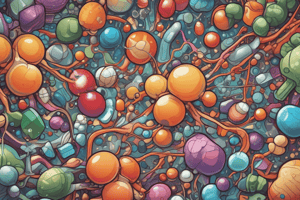Podcast
Questions and Answers
Which vitamins are less likely to be toxic unless taken in large amounts?
Which vitamins are less likely to be toxic unless taken in large amounts?
- Vitamin C (correct)
- The B Vitamins (correct)
- Fat-Soluble Vitamins
- All of the above
Fat-soluble vitamins are dissolved in lipid materials.
Fat-soluble vitamins are dissolved in lipid materials.
True (A)
How are vitamins sourced for humans?
How are vitamins sourced for humans?
Dietary sources
The term 'vitamin' was originally '__________'.
The term 'vitamin' was originally '__________'.
Which of the following statements about synthetic vitamins is true?
Which of the following statements about synthetic vitamins is true?
All species can synthesize vitamin C.
All species can synthesize vitamin C.
What are the two classes of vitamins based on solubility?
What are the two classes of vitamins based on solubility?
Water-soluble vitamins must be constantly __________ due to rapid elimination via urine.
Water-soluble vitamins must be constantly __________ due to rapid elimination via urine.
Flashcards are hidden until you start studying
Study Notes
General Characteristics of Vitamins
- Essential organic compounds required in small amounts for proper bodily function.
- Cannot be synthesized by the body, must be obtained from dietary sources.
- Divided into two classes based on solubility: water-soluble and fat-soluble.
- Vitamins function as cofactors in conjugated enzymes and many enzymes incorporate vitamins into their structure.
- The term “vitamin” originates from “vitamine,” derived from the Latin word “vita” meaning "life."
- Daily requirements range from microgram to milligram levels, contrasting with macronutrients like carbohydrates, lipids, and proteins.
Water-Soluble Vitamins
- Require constant replenishment due to rapid elimination through urine.
- Carried in the bloodstream and typically require frequent small doses.
- Less likely to be toxic unless taken in large amounts.
Fat-Soluble Vitamins
- Stored in fat tissues and tend to accumulate in the body; thus, periodic doses are necessary.
- Carried by protein carriers in the blood.
- More likely to be toxic if consumed in excess.
Vitamin C
- Structurally the simplest of the 13 known vitamins, existing in two active forms: oxidized and reduced.
- Synthesized from glucose derivatives by plants and most animals.
- Humans, monkeys, apes, and guinea pigs are among the few species that require dietary sources for vitamin C, while other species can synthesize it from carbohydrates.
The B Vitamins (Vitamin B Complex)
- B vitamins serve as coenzymes in various biochemical reactions in humans and animals.
- Unlike many vitamins, they are rarely utilized by microorganisms in metabolic functions.
Studying That Suits You
Use AI to generate personalized quizzes and flashcards to suit your learning preferences.




